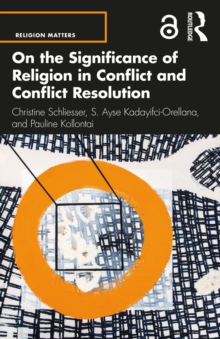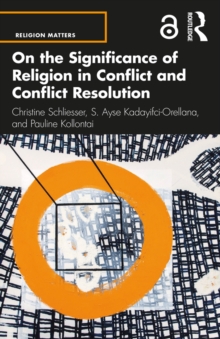
On the Significance of Religion for Global Diplomacy PDF
by Philip McDonagh, Kishan Manocha, John Neary, Lucia Vazquez Mendoza
Part of the Religion Matters series
Description
What could it mean, in terms of strengthening multilateral diplomacy, if the UN, the Organisation for Security and Cooperation in Europe (OSCE), the European Union, and other regional diplomatic frameworks engaged more creatively with a religious perspective?
In this ground-breaking volume it is argued that international organisations, backed by governments, can and should use their convening power to initiate new, multi-layered frameworks of engagement, inclusive of the representatives of religion.
This can make multilateralism more fit for purpose and have a major impact over time on our planetary future.
The book is divided into an introduction and six chapters: Towards a culture of encounter inclusive of the world’s religious traditions Structural questions in 21st-century diplomacy Knowing what we ought to know: the issues that face 21st-century diplomacy Towards the global objective of a common peace for humanity Understanding how change happens The diplomacy of the two standards The development of new frameworks of engagementA brief outline is offered of what an all-European initiative – an agora for Europe – might look like if, in the 2020s, there were the political will to inaugurate a European regional process reflecting the orientation and methodology proposed in the book.
Combining cutting-edge research and reflection, with concrete recommendations for academics, religious actors, policy makers, and practitioners, this concise and accessible volume helps to build bridges between these oftentimes separated spheres of engagement. The Open Access version of this book, available at https://doi.org/10.4324/9781003053842, has been made available under a Creative Commons Attribution-Non Commercial-No Derivatives 4.0 license.
Information
-
Download - Immediately Available
- Format:PDF
- Pages:182 pages
- Publisher:Taylor & Francis Ltd
- Publication Date:04/11/2020
- Category:
- ISBN:9781000264098
Other Formats
- Paperback / softback from £18.95
- EPUB from £2.99
- Hardback from £96.29
Information
-
Download - Immediately Available
- Format:PDF
- Pages:182 pages
- Publisher:Taylor & Francis Ltd
- Publication Date:04/11/2020
- Category:
- ISBN:9781000264098










